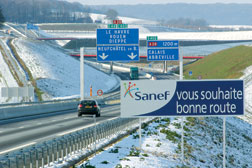|
...blocked by French financial regulators. Sacyr bought 30.33% for $2.5 billion in 2005, later raising its stake to 32.61%.
Abertis Infraestructuras S.A. also is having a hard time trying to merge with its Italian counterpart, Atlantia S.p.A, known formerly as Autostrade. The merger, to create the world’s biggest toll road operator, was scuppered by the Italian government late last year. Abertis is awaiting findings of European Union investigations into Italy’s allegedly illegal protectionist move before deciding whether to revive the merger talks, says spokesman Pedro Alonso. Abertis had it easier in 2005, buying control of north France toll-road operator SANEF from the French government. With SANEF's 1,770-kilometer network, Abertis's portfolio exceeds 3,200 km.
To enter the U.S. market, Spanish contractors are targeting niche, specialist activities. Acciona S.A., is building a portfolio of renewable energy projects in the U.S., starting three years ago by acquiring a 74-MW wind farm in Oklahoma. With group sales last year of $8.6 billion in construction, concessions, services and energy, Acciona is one of the world’s biggest wind power developers with 4,700 MW in 10 countries. It recently secured rights to develop 1,300 MW of wind power in the Midwest and last year commissioned a 64-MW solar thermal plant in the Nevada desert. Breaking New Ground Of three contracts ACS Dragados won since setting up in the U.S. last year, the biggest involves the first-time use of hard-rock tunnel-boring machines on New York City’s Second Avenue subway project. The contract fits ACS’s strategy of targeting international “infrastructure concessions and construction projects requiring a high degree of specialization,” according to a company official. “Our aim is...to increase ACS’s direct participation in the U.S. market both in civil works and concessions business, using local partners,” notes the official. The company’s concessions unit Iridium last year set up ACS Infrastructure Development Inc. It is tracking upcoming toll roads in California, Florida and Texas, where it is competing for three concessions. Iridium has some 40 concessions under development in Western Europe and Chile and South Africa, over half in highways. But in the U.S. toll-road race, Cintra is laps ahead. Cintra is 60%-owned by Ferrovial but is stock market listed and acts independently, says Austin, Texas-based U.S. Director José Lopez. Seven of Cintra’s 12 largest investors are North American institutions, he adds. Set up in 1998, Cintra acquired Ferrovial’s shares in five toll roads in Spain and Chile, plus other assets and resources. It now manages 23 toll highways in Spain, Portugal, Ireland, Greece, Chile, Canada and the U.S. totaling more than 2,800 km. Cintra is still smarting from the Texas Dept. Transportation's late June decision to overrule its winning bid for the SH-121 toll highway concession, The agency offered the project conditionally to non-bidder North Texas Tollway Authority instead. “We keep believing Texas is a good place to invest…if we see a reasonable process,” says Lopez. “We can finance and even create cash up front that is used to improve other parts of the network.” Although the firm is in joint ventures elsewhere, Cintra still has paid billions of dollars for long-term leases for the existing Chicago Skyway and Indiana Toll Road but also is interested in greenfield projects. Having lost the Indiana bid, Sacyr’s concessions unit Itinere Infraestructuras S.A. is not concentrating only on privatizations, says Development Director Alberto Jiménez. “We go also for greenfield [projects] and we always prefer to go with...Sacyr,” he says. “We can add more value if we go together [because] we know how to manage the construction risk between us.” Starting with a Chilean highway 10 years ago, Itinere now has interests in more than 40 concessions in various sectors in Europe and Latin America. They include toll roads of the smaller Spanish operator Europistas C.E.S.A, which Itinere bought late last year. Although Spain now accounts for 70% of Itinere’s business, the firm has about 12 bids out “in many other countries where there are more and bigger opportunities,” says Jiménez. Among U.S. operations, Itinere is in one of three consortiums prequalified to bid for a concession covering part of Virginia Route 460. Another potentially big U.S. player is Abertis Infraestructuras S.A. “Our profile is more industrial...than financial,” says Toni Brunet, corporate communications director. “Infrastructure has a long life cycle and you have to have the ability not only to finance...but also to manage it.” Listed on the Madrid stock exchange, Abertis is 24.8%-owned by ACS. But it acts independently and is free to compete with ACS’s Iridium, says Brunet. Albertis was almost an entirely domestic operator three years ago, but now has half its business abroad. That shift followed the firm’s acqui-sition of the medium-sized U.K. airport operator TBI plc. With concessions now in Central and South America, Abertis’s aim “is to diversify...gen-erally into western markets,” says Brunet. Spanish toll operators are looking to the U.S. with a mixture of uncertainty and optimism. Political unease about infrastructure privatization and the great diversity of procurement models among states present a confusing picture. “We have been involved in [ the U.S.] since 1999. It gives us a measure of how much dedication you have to give,” says Lopez. “It is very slow.” For environmental and other reasons, greenfield projects in the U.S. seem to take forever, he adds. Despite the delays, “there is a lot of competition popping up now,” Lopez says. “Some funds have been created to invest in the infrastructure market and a lot of money has been raised.” Speaking from Madrid, Jiménez says, “We have in Europe a lot of experience in how this business works. Here in Spain, we have concessions running for over 30 years. In the U.S., this is a completely new market.” But if firms can apply a great deal of patience,“we really think there could be good opportunities,” he says. |


 Related Links:
Related Links: 